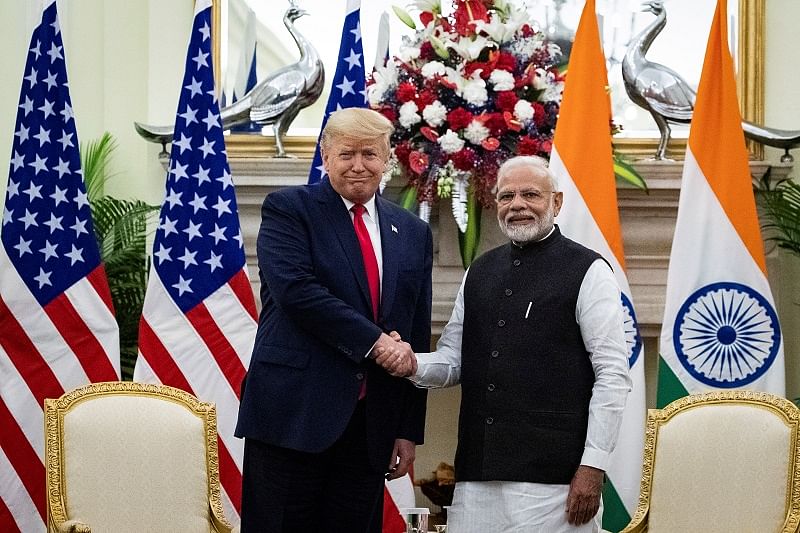
Donald Trump failed Tuesday to strike any major trade deal with India at the end of a visit big on photo opportunities but short on substance and overshadowed by deadly riots.
Speaking after talks in New Delhi with Prime Minister Narendra Modi, the US president said only that they had made "tremendous progress" towards a comprehensive agreement and that he was "optimistic we can reach a deal".
While minor compared to his trade war with China, Trump has slapped tariffs on Indian steel and aluminium and suspended duty-free access for certain goods in an effort to cut the $25-billion US trade deficit with Asia's third-biggest economy.
Under pressure to deliver ahead of elections in November, he has pressed for greater access to the vast Indian market of 1.3 billion people for US dairy producers, makers of medical goods and for Harley-Davidson motorcycles.
But Modi, who has a lot in common with Trump with his "Make in India" mantra echoing Trump's "America First" slogan, has responded with higher tariffs on US goods including $600 million worth of Californian almonds.
Modi, speaking alongside Trump a day after they appeared together at a raucous rally in front of 100,000 people, said only that both sides "have agreed to start negotiating for a big trade deal".
Arriving on Monday Trump hailed India and its "tremendously successful" but "very, very tough" Modi at the rally inside the world's largest cricket stadium in Modi's home state Gujarat.
The razzmatazz of the "Namaste Trump" event was recompense for a "Howdy Modi" extravaganza in Houston last year when the two leaders held hands and Trump compared Modi to Elvis Presley.
Trump and First Lady Melania then flew to the Taj Mahal where they held hands, and on Tuesday were given the full pomp of an official welcome and paid tribute to Mahatma Gandhi at the independence hero's memorial in Delhi.
Trump and Modi did however announce $3 billion in defence deals, including for the sale of naval helicopters, proof of their deepening strategic alliance to counter the rise of China in the region.
But the absence of a trade deal between the world's biggest economy and its second most populous nation showed that behind the bonhomie they remain far apart. At Monday's rally Trump described Modi as "very very tough".
Trump, at least in public, stopped short of voicing unease about a new citizenship law that has raised concerns abroad, including in Washington, about the direction of India under Modi.
The law, which critics say forms part of Modi's plan to remould secular India as a Hindu nation -- something he denies -- has sparked weeks of protests and violence, including in Delhi on Monday and Tuesday.
A standoff between supporters and opponents of the law degenerated into running battles between Hindus and Muslims on the northeastern fringes of the megacity of 20 million people, local media reported.
The seven dead included a policeman, a senior police officer told AFP on condition of anonymity. He said that more than 90 civilians and almost 50 people have been injured.
Rioters armed with stones, swords and even guns went on the rampage, setting fire to buildings and vehicles. Further rioting was reported on Tuesday with a large cloud of black smoke rising in the sky.
"We are getting reports of ongoing incidents of violence," senior policeman Alok Kumar told AFP. "The protesters are attacking police wherever they are present and clashing among each other where the police aren't there."
The authorities responded with tear gas and smoke grenades, sending in paramilitary security forces, shutting schools and banning the assembly of more than four people in the areas affected.
Against that backdrop, the First Lady visited a school to watch a "happiness class" in which children meditate and focus on mindfulness to make them better pupils and citizens.
The curriculum was launched in 2018 by Tibetan spiritual leader the Dalai Lama and has piqued the interest of Melania Trump who has promoted a "Be Best" initiative for US children.